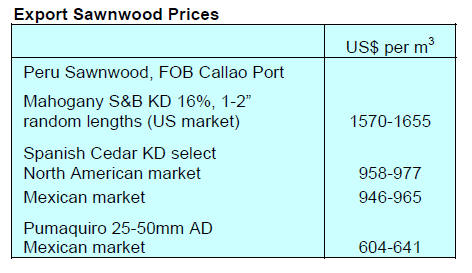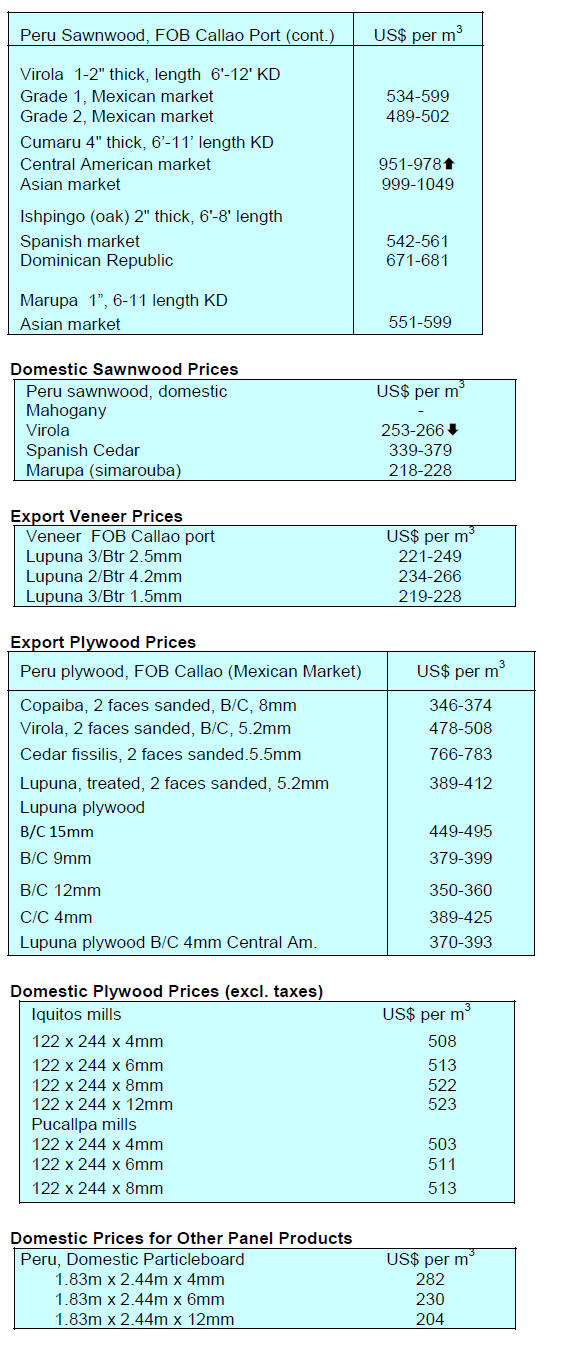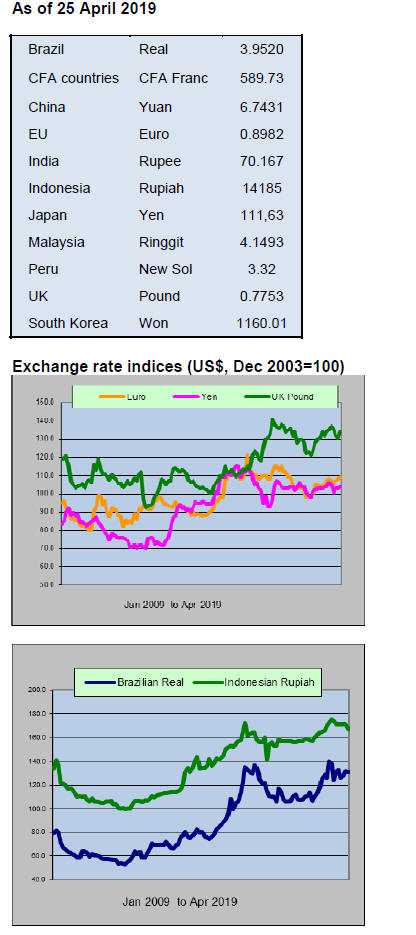3.
MALAYSIA
4.6 million ha. PEFC certified
forests in Malaysia
The Malaysian Timber Certification Council (MTCC)
started operation in January 1999 as an independent
organisation to develop and operate the Malaysian Timber
Certification Scheme (MTCS). This has been endorsed by
the Programme for the Endorsement of Forest
Certification (PEFC) which covers around than 300
million ha. of certified forests worldwide.
As of April 2019 there were 4.607 million hectares of
PEFC Certified Forests in Malaysia. There are 362 PEFC
Chain of Custody certificate holders.
In collaboration with the Peninsular Malaysia Forestry
Department, MTCC recently organised a seminar to
expand the understanding of forestry officers from the
various state forestry departments on the implementation
and requirements of forest management certification under
the MTCS.
Forestry officers from state forestry departments of Johor,
Kedah, Kelantan, Negeri Sembilan, Pahang, Perak,
Selangor and Terengganu as well as FD HQ staff
participated in the seminar.
2019 GDP forecast at almost 5%
The World Bank has forecast that Malaysia’s 2019 GDP
should reach 4.7% driven by private consumption. Richard
Record, the resident economist for Malaysia, said private
consumption should continue rise but at slightly slower
pace than in recent years.
See:
https://www.malaymail.com/news/malaysia/2019/04/24/worldbank-
keeps-malaysias-2019-gdp-outlook-at-4.7pc/1746392
Timber trade with China continues to rise – but steady
decline in log exports
Demand for raw material from China’s timber processing
industries continues to rise and Malaysia’s exports of
timber to China are providing much of China’s timber raw
material needs.
In 2014 Malaysia’s exports of wood products to China
were valued at RM872.6 million and this jumped to
RM1.1 billion in 2018 with sawnwood being the main
export. Malaysia’s imports of wood products from China
are also significant and growing. Imports were worth
RM708.6 million in 2013 rising to RM1.5 billion in 2018.
Malaysia mainly imported wooden furniture (RM719.4
million), plywood (RM135.5 million), veneer (RM155.3
million) and other products including builders woodwork,
joinery, mouldings and fibreboard.
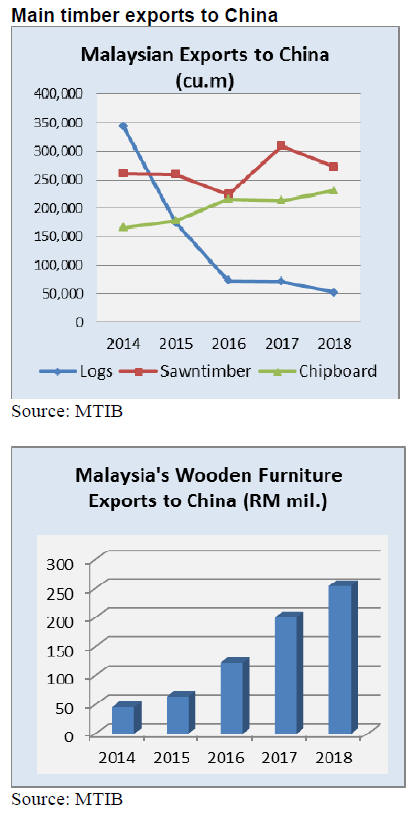
Plans for pulp/paper mill in Sarawak
A recently signed MOU between a China-based Fortune
500 company and the Sarawak State Economic
Development Corporation (SEDC) outlines plans for a
joint investment in a pulp and paper manufacturing plant
to be located in the Samalaju Industrial Park, Bintulu.
The Chinese company, Shan Ying, which is listed on the
Shanghai Stock Exchange, is a manufacturer and
distribution of paper products.
The proposed plant will integrate pulp and paper
manufacturing and the production capacity is said to be in
the region of 2 million tonnes annually. The Malaysian
media has reported construction will begin next year.
Sarawak Chief Minister, Abang Johari Tun Openg, said
the plant would use imported recycled paper for its
production not natural resources from Sarawak within.
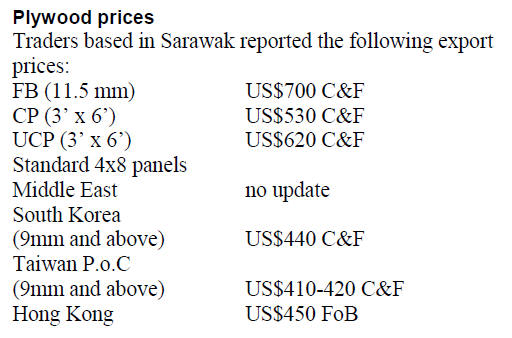
Plywood import ban
The Sarawak Timber Industry Corp (STIDC) website has
an announcement a ban on importation into Sarawak of
ordinary plywood above 6 mm thickness with effect 18
April 2019. As more information becomes available it will
be reported.
https://www.sarawaktimber.gov.my/pages.php?mod=announcem
ent&sub=announcement_detail&id=41
4.
INDONESIA
Fall in plantation log
production
Plantation roundwood production in the first two months
of 2019 fell 21% compared to production in the same
period in 2018 according to Purwadi Soeprihanto,
Executive Director of Indonesian Forest Concessionaire
Association (APHI). In 2018 roundwood production was
3.91 million cubic metres per month.
Purwadi said the decline in log production in early 2019
was a reflection of weaker demand for raw materials.
Millers have said the on-going US-China trade conflict is
affecting the performance of the main finished product
exporters for whom plantation logs are the raw material.
Based on the V-Legal data from the Ministry of
Environment and Forestry, in the first quarter of this year
export of processed wood products totalled US$2.82
billion down 18% year on year.
Purwadi forecast that this year roundwood production
from industrial timber plantation concessions (HTI) will
increase 10% compared to last year's production of 40.13
million cubic metres while production from natural forests
will be about the same as in 2018.
https://ekonomi.bisnis.com/read/20190409/99/909457/rerataproduksi-
kayu-bulat-terkoreksi-21
In related news, the Ministry of Environment and
Forestry
(KLHK) has announced it is not planning to issue new
permits for industrial timber plantation concessions (HTI)
this year. Hilman Nugraha, Director General of
Sustainable Production Forest Management in the KLHK,
said the current HTI permits covering 11.43 million
hectares is sufficient to meet the industrial needs.
First quarter 2019 panel exports drop
The KLHK export database is showing that the value of
panel exports in the first quarter of 2019 fell sharply. The
Director of Processing and Marketing of Forest Products
at KLHK said international demand remains sluggish and
this is affecting exports.
In the first quarter of 2019, the value of panel exports was
US$550.27 million, down 13% compared to 2018. In
contrast to the decline in the value of panel exports,
exports of veneer in the first quarter 2019 increased 12%.
https://ekonomi.bisnis.com/read/20190409/99/909445/kuartali2019-
ekspor-kayu-panel-terkoreksi-us83.17-miliar
Need to expand downstream manufacturing
The Executive Director of the Center of Reform on
Economics, Mohammad Faisal, has pointed out that,
despite being one of the largest wood product exporters in
the world, the value of Indonesia’s furniture exports is
only ranked 17th in the world. He urged greater efforts to
restructure the development of the manufacturing industry.
He lamented that raw materials are exported especially to
China to be manufactured into high value products for
export.
https://www.liputan6.com/bisnis/read/3937454/genjot-ekspormebel-
indonesia-harus-benahi-industri-hilir-kayu
Minister of Trade – no raw rattan export
The Indonesian Minister of Trade, Enggartiasto Lukita,
has reiterated his ministry’s intention not to permit exports
of raw rattan because it will undermine the Indonesian
rattan industry and only enrich manufacturers in the
importing countries. He said Indonesia needs to find ways
to expand rattan product manufacturing within the
country.
One issue to be resolved is the difference between the
abundance of rattan in Central Kalimantan and the long
distance to manufacturers who are mainly concentrated in
West and Central Java.
In sharp contrast to the stance of the Minister of Trade,
rattan producers complain about the effect of the export
ban on rattan prices. They claim that the domestic industry
cannot absorb their production and this drives down raw
rattan prices. They say they have witnessed a 40% drop in
prices over the past 2 years.
Chairman of the Indonesian Rattan Entrepreneurs
Association (APRI) Kalimantan, Herman Yulius, said
currently land owners are depressed because rattan prices
continue to fall and they have no alternative market
outlets.
APRI has requested the government to either permit the
export of raw rattan so land owners can benefit or make
greater efforts to attract investment in rattan product
manufacturing.
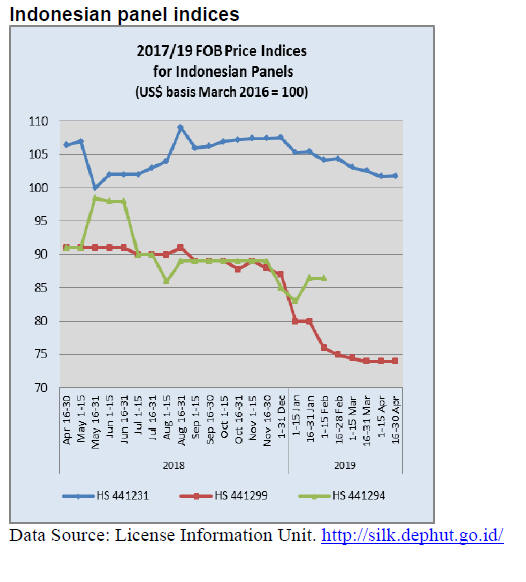
5.
MYANMAR
Power outages scheduled – manufacturers and
households affected
Manufacturers and households have been advised by the
Mandalay Electricity Supply Corporation (MESC) to
brace for scheduled power cuts. In a statement the MESC
said it will cut power across different areas in Mandalay
and the cuts will be around one to two hours at a time.
MESC has blamed increased demand and lower output
from its power plants.
Myanmar’s capital Yangon experienced day time
temperatures of 42 degrees centigrade last week beating
the past record high of 41 degrees. The Department of
Meteorology in Myanmar reported new temperature
records for five cities.
The hottest was Chauk on the banks of the Irrawaddy
River in central Myanmar where temperatures have been
above 40 degrees in April. In these temperatures forest and
mill operations have slowed considerably.
Trade regulation to protect domestic manufacturers
Added value wood products are amongst the target of an
initiative of the Ministry of Commerce (MOC) as it drafts
new trade regulations aimed at protecting domestic
manufacturers and at the same time promoting exports of
locally made products.
U Than Myint, Minister of Commerce, said because local
manufacturers have been slow in investing in the latest
production technologies they face tough competition from
exporters in neighbouring countries.
The draft regulations are being developed with
assistance
from the World Bank and German development agency
GIZ. Sectors with the greatest potential for higher added
value production have been identified as agricultural and
marine products, textiles and wood products.
Domestic building boom – timber producers
benefitting
Domestic timber producers have been able to take
advantage of the booming investment in the real estate
sector in Myanmar which has seen massive inflows of
foreign investment.
According to a report from the Directorate of Investment
and Company Administration (DICA) over US$1 billion
in foreign investment flowed into the real estate sector in
fiscal 2017, second only to the amount that went into
manufacturing.
https://www.colliers.com/en-gb/myanmar/insights/marketintelligence/
mar25-mar29-2019
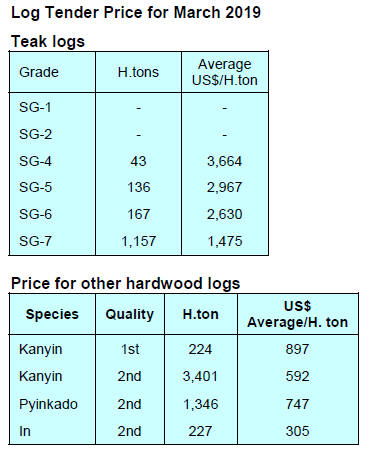
6. INDIA
Public-private partnership to develop
plantations
The draft Indian Forest Act 2019, an amendment to the
Indian Forest Act 1927, includes reference to production
forests, mainly commercial plantations, in its definition of
forests.
There is heated debate as to whether tree plantations can
be defined as forests given the commonly understood
definition in India. The government has said no action on
the draft will be taken before receiving state governments’
comments.
Professor, NH Ravindranath of the Indian Institute of
Science commented “If production forests are located in
protected or reserve forest areas it’s not good idea as there
will be fragmentation of forests. Such a move he says
could also open the gates for illegal smuggling”.
In a follow-up to the draft amendment of the Forestry Act
the government has released details of its policy for
public-private partnership to develop plantations in
“degraded” forests. Analysts say the draft awaits Cabinet
approval and will be taken up after the elections.
https://www.hindustantimes.com/india-news/timber-productionforests-
find-place-in-forest-act-draft/story-
4BKI0rOsqjSYNXDMpQdegN.html
World Bamboo Workshop 2019
A five-day workshop focused on the need to make better
use of and develop bamboo as it is a renewable sustainable
and alternative to timber and plastics.
The Executive Director of the World Bamboo
Organisation, Susanne Lucas, called for the wider
application of biodegradable products such as bamboo.
She announced that the WBO and government of Manipur
will be signing an agreement which recognises the
essential contribution of bamboo in the fight against
climate change. It sets out to free bamboo from the
restrictions of outdated national forestry codes and to
support research, exchange knowledge and improve
communication on bamboo development.
http://www.ifp.co.in/page/items/56116/3rd-world-bambooworkshop-
2019-concludes
Plantation teak prices
C&F prices for plantation teak landed at Indian ports are
within the same range as shown in the previous report.
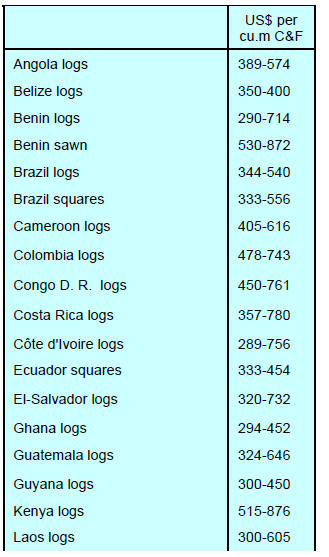
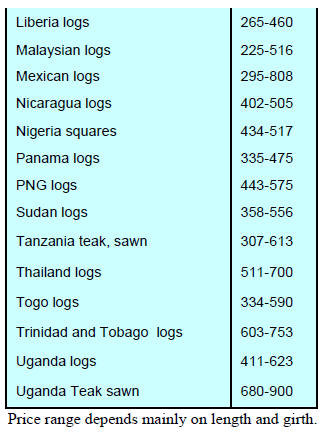
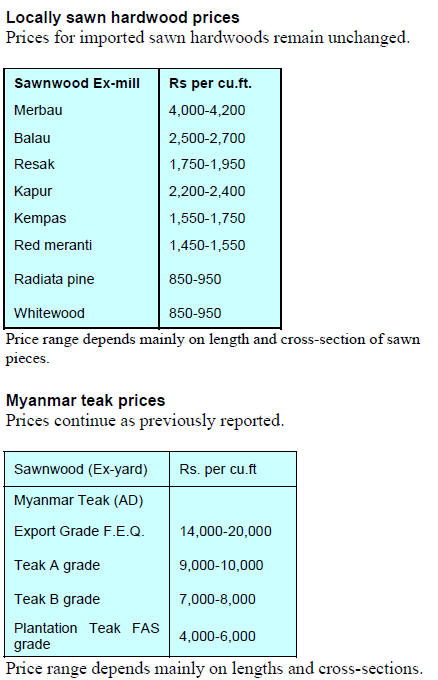
Sawn hardwood prices
Shipments of US sawn hardwoods to India are rising and
this, along with a steady flow of European hardwoods, is
keeping market prices stable.
Indicative prices for some imported timbers are shown
below.
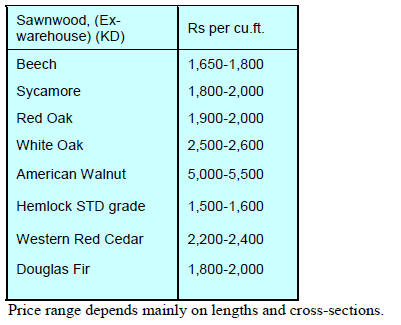
Plywood
The financial plight of domestic plywood manufacturers
has not improved. Production costs continue to rise but the
quiet market for plywood offers no chance for price
increases. Manufacturers are looking to lower labour costs
through automation and improved veneer recovery.
Veneer producers in Gabon are increasing production and
shipments to India. Some of the Indian mills in Gabon,
especially those that do not have forest concessions, have
raised concerns on log availability.
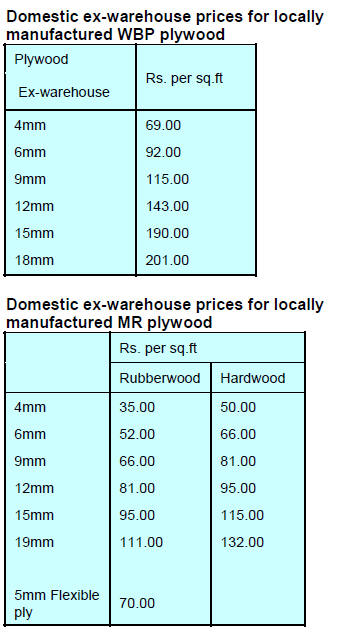
7. BRAZIL
Positive start to year for furniture makers
in Rio Grande do Sul
The Market Intelligence Institute (IEMI), in a report
published in March, shows that January 2019 furniture
production in Rio Grande do Sul State, one of the major
furniture producing states, was up 5% compared to
December 2018.
Over the past 12 months industrial production in the State
expanded by 15%. The apparent consumption of furniture
in Rio Grande do Sul in January 2019 was reported at 6.5
million pieces, a 6% increase over the previous month.
The Furniture Industry Association of Rio Grande do Sul
(Movergs) is forecasting a good year ahead.
Private sector partnership to boost SFM in Mato
Grosso
The forest-based sector in Mato Grosso, through the
Center for Timber Producers and Exporters of Mato
Grosso State (Cipem) and the Sustainable Trade Initiative
(IDH), signed a memorandum of understanding in March
to promote the forest-based sector of Mato Grosso, one of
major timber producing states in the Amazon Region.
Through the partnership, various activities will be
developed to improve the value chain of the forestry sector
in the state.
Actions include technical and financial support; exchange
of knowledge; feasibility studies and operationalisation of
a sustainability certification system that complies with
Brazilian legislation and international protocols and the
development of communication strategies to improve the
image of the forest base sector and access to new markets,
both in Brazil and abroad.
One of the objectives is to establish mechanisms for
transparency and governance to attract investments to
Mato Grosso State to underpin the sustainable
development of the state. The commitment to the natural
forests is to reach 6 million hectares under sustainable
forest management in the Mato Grosso state. Currently,
the state has 3.7 million hectares of managed private
forests.
https://www.cipem.org.br/cipem-e-idh-firmam-parceria-paraimpulsionar-
cadeia-produtiva-do-manejo-florestal-sustentavelem-
mato-grosso/
Export update
In March 2019, Brazilian exports of wood-based products
(except pulp and paper) increased 3.4% in value compared
to March 2018, from US$ 270.8 million to US$ 279.9
million.
The value of pine sawnwood exports increased 13.5%
between March 2018 (US$44.6 million) and March 2019
(US$50.6 million). In terms of volume, exports increased
29% over the same period, from 211,700 cu.m to 273.9
cu.m.
Tropical sawnwood export volumes rose 24% from 38,100
cu.m in March 2018 to 47,400 cu.m in March 2019. The
value of these exports increased 15% from US$17.5
million to US$20.1 million over the same period.
In contrast, the value of pine plywood exports dipped 12%
in March 2019 in comparison with March 2018, from
US$64.3 million to US$56.5 million but in volume trems
there was a slight rise from 194,600 cu.m to 206,300 cu.m.
Tropical plywood exports also declined in March from
16,600 cu.m (US$7.1 million) in March 2018 to 9,600
cu.m (US$ .6 million) in March 2019.
The growth in furniture exports slowed in March with the
value rising to just US$45 million from the US$ 44
million in March 2018.
Increased use of logs for export manufacturing
The Brazilian Agricultural Research Corporation
(EMBRAPA) and the Paraná State Forest Based
Companies Association (APRE) recently concluded there
has been an increase in the demand for logs for domestic
processing.
Demand for logs is high despite the weak domestic
economy because companies are increasing their exports.
The consumption of logs by local mills is estimated at
about 14 million cubic metres annually.
Most millers are vertically integrated but also buy between
30% and 40% in the open market. Millers complain that
logs in the open market are becoming smaller in diameter
and the transport distance is increasing all as a result of
increased consumption.
The states of Paraná and Santa Catarina have expanded
their eucalyptus plantations by about 190,000 hectares to
meet the rising demand.
Fast pace furniture export growth
The Bento Gonçalves Furniture Industry Union
(Sindmóveis) reported an almost 18% year on year rise in
furniture exports in the first quarter of 2019. Since 2018
exports of furniture from the State grew at a faster pace
than anywhere in the entire country.
Among the main destinations for furniture exports were
the United States, followed by Uruguay, Chile, Colombia
and Saudi Arabia, which were the five main destinations
for furniture in the first quarter. Other markets included
Mexico (+ 93%), the United Kingdom (+ 228%), Panama
(+ 84%) and Puerto Rico (+ 67%).
Sindmóveis focuses its work aiming for greater
international investments and diversification of markets.
Sindmóveis works on many fronts with the Brazilian
furniture sector to explore markets opportunities.
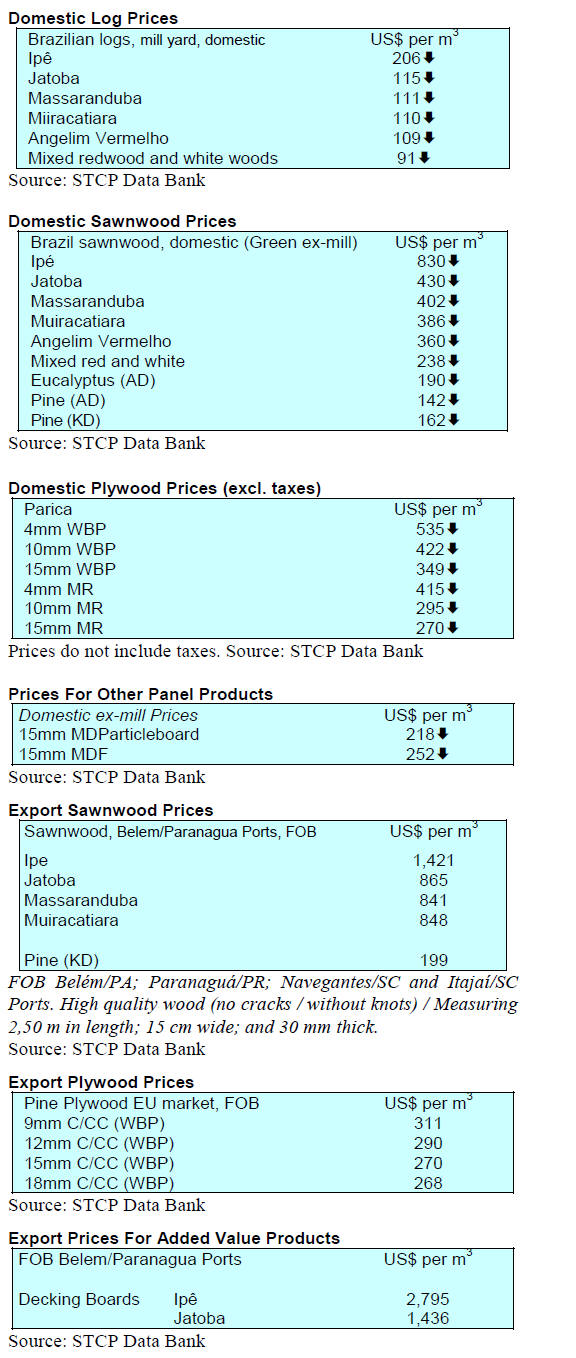
8. PERU
Flooring/decking exports up over 30%
According to the Association of Exporters (ADEX),
exports of wooden flooring/decking in the first two
months of the year earned just over US$13 million, an
increase of 31% over the same period in 2018. The
improved performance was due to increased demand in
China, France and Denmark.
Flooring/decking shipments accounted for almost three
quarters of total timber exports, significantly overtaking
shipments of sawnwood (US$3.1 million) and builders’
woodwork, joinery and mouldings.
The timbers shipped included shihuahuaco, ana caspi and
storaque which are used primarily for pool surrounds and
terrace construction.
The value of 2018 shipments of timber for flooring was
nearly 8% higher than a year earlier, the highest for the
past eight years.
The top markets for wood products were China (US$6
million, a 46% share) and France (US$2.9 million, 22%
share). Other market destinations included Denmark
(US$0.8 mil.), Mexico (US$0.6 mil.), Dominican
Republic (US$0.5 mil.), Belgium (US$0.4 mil.) and
Australia (US$0.4 mil.).
There was a recovery in exports to the US at US$2.9
million and this reversed the decline which began in 2014.
Mission to Interzum and Ligna
In May this year Peruvian business executives, with the
support of Tropical Forest Peru, will participate in
Interzum and Ligna, leading fairs for the wood and
furniture sector to be held in Cologne and Hannover. This
will mark the seventh occasion entrepreneurs have
participated.
